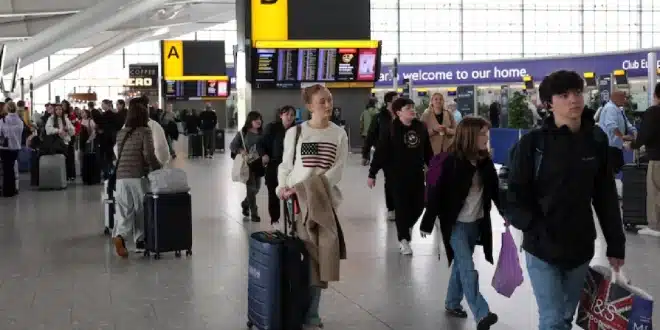Air travel across Europe was disrupted on Saturday after a cyber-related outage struck automated check-in and baggage systems at several major airports, including Brussels, Berlin, and London’s Heathrow. The issue forced flight cancellations, long delays, and a widespread shift to manual operations.
Airport service provider Collins Aerospace confirmed that its MUSE software, used for passenger check-in and baggage handling, had been affected at multiple hubs. “We have become aware of a cyber-related disruption to our MUSE software in select airports,” the company said in a statement, adding that manual check-in procedures were being used to mitigate the impact.
The outage was first reported overnight on Friday, hitting Brussels Airport particularly hard. By Saturday morning, the hub had already canceled at least 10 flights and delayed another 17 by more than an hour. Airport authorities described the disruption as a “cyberattack” and warned that schedules would continue to be severely affected.
Eurocontrol, Europe’s aviation watchdog, instructed airlines to cut half of all flights to and from Brussels between 4:00 a.m. GMT Saturday and 2:00 a.m. GMT Sunday to ease congestion. Passengers were advised to check flight status before heading to the airport.
Widespread Disruption in London and Berlin
London’s Heathrow Airport—the busiest in Europe—also reported technical problems tied to Collins Aerospace systems. “This may cause delays for departing passengers,” the airport said, though manual operations were helping to keep flights moving.
Berlin Airport issued a similar warning, posting a banner on its website that read: “Due to a technical issue at a system provider operating across Europe, there are longer waiting times at check-in.”
Collins Aerospace said it was “actively working to resolve the issue and restore full functionality to our customers as quickly as possible.” The company, a subsidiary of American aerospace and defense giant RTX (formerly Raytheon), provides digital and data-driven solutions for the aviation industry.
A Growing Cybersecurity Threat to Aviation
The incident underscores the aviation sector’s increasing vulnerability to cyberattacks and technical failures. With airlines and airports heavily reliant on interconnected digital systems, disruptions have become more frequent and damaging.
According to a June 2025 report by French aerospace company Thales, the industry experienced a 600 percent surge in cyberattacks between 2024 and 2025. The report noted that “from airlines and airports to navigation systems and suppliers, every link in the chain is vulnerable to attack,” warning that aviation has become a “prime target” for hackers due to its strategic and economic importance.
Recent years have seen multiple high-profile breaches. In July 2024, Qantas confirmed hackers had accessed sensitive data on six million customers. Later that year, Japan Airlines also suffered a cyberattack. Even non-malicious IT failures have wreaked havoc, including a massive global system crash in July 2024 that grounded flights worldwide and forced airports to fall back on manual check-in, creating chaos for travelers.
What This Means
Saturday’s disruptions highlight how dependent modern air travel is on digital infrastructure—and how quickly that reliance can turn into a vulnerability. With cyber threats rising and aviation at the center of global connectivity, security experts warn that both airlines and governments must intensify investment in cyber resilience to avoid similar incidents escalating into full-scale crises.


